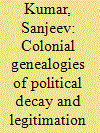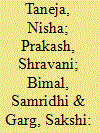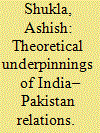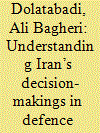|
|
|
Sort Order |
|
|
|
Items / Page
|
|
|
|
|
|
|
| Srl | Item |
| 1 |
ID:
172319


|
|
|
|
|
| Summary/Abstract |
This article is an attempt to conceptualise and theoretically explain the colonial genealogies of the processes of state-making and state-construction in post-colonial South Asia. In pursuit of this, the article seeks to theorise the colonial ways of providing a sense of fixity of political territoriality, held together by colonially crafted institutions of metropolitan governance, as an independent variable in determining the nature of the processes of state-making and state-construction in the region. On this count, an enquiry into the complex trajectory of these post-colonial political processes, which are the dependent variables for this article, is the fundamental problematic of analysis. This problematic would be decoded with the help of a dual conceptual framework, involving what Samuel Huntington designates as political decay and the legitimation crisis given by Jurgen Habermas. In the context of South Asia, the predicaments of political decay and legitimation crisis, according to this article, manifest as after-effects of engagement on the part of the region’s post-colonial polities with the imported values of colonial modernity and neoliberal economic reforms. By drawing instances from two countries of the Indian subcontinent, Pakistan and Bangladesh, the article tries to show how these after-effects have played out in the form of a tumultuous political history of the processes of state-making and state-construction. The article, in this way, is an attempt to theorise the inter-sectionalities between the colonial and post-colonial periods of South Asia. This has been done here by problematising such a historical inter-sectionality from the perspective of the two intervening variables—the received values of colonial metropolis and the morals of modernity—mediated through neoliberal economic reforms.
|
|
|
|
|
|
|
|
|
|
|
|
|
|
|
|
| 2 |
ID:
172296


|
|
|
|
|
| Summary/Abstract |
Of late India–South Korea relations have witnessed an upswing with the elevation of bilateral relation to Special Strategic Partnership (SSP) in 2015. Explaining the context and developments in bilateral relations, the article observes that the new momentum articulated in SSP constitutes a convergence of interests through the meeting of India’s ‘Act East Policy’ and South Korea’s ‘New Southern Policy’. The growing cooperation in defence, security, development, industry and a shared vision for regional order has visibly enhanced the scope and depth of the strategic partnership between the two countries, however, not without challenges in the emerging Indo-Pacific regional context.
|
|
|
|
|
|
|
|
|
|
|
|
|
|
|
|
| 3 |
ID:
172302


|
|
|
|
|
| Summary/Abstract |
India and Nepal have traditionally shared a unique relationship of friendship and economic cooperation. The relationship is characterised by an open and people-friendly border and is built on shared historical, cultural, linguistic and ethnic links between people residing in India and Nepal.
With Nepal being a priority under India ‘Neighborhood First’ policy, strengthening the economic relationship holds immense significance and potential for both the countries. While the political relations between India and Nepal have been extensively studied, there is not much literature that explores the economic relationship between the two nations. This is an important issue to study, as India is Nepal’s largest export market, the biggest source of its imports, the top investor of foreign capital stock and among the largest donors of foreign aid. India also provides Nepal transit facility through its territory to access seaports for trading with the rest of the world.
Given this, the main objective of this article is to suggest policy measures, which can increase bilateral trade and investment between India and Nepal. The article analyses the bilateral trade patterns and estimates the maximum additional trade potential. A wide range of issues of importance pertaining to bilateral trade, including tariffs, levy of an agricultural reform fee, under utilisation of the tariff rate quota, non-tariff measures, issues related to Rules of Origin (ROO) and physical barriers to cross-border movement of goods are discussed. The trends and changing sectoral composition of India’s investment in Nepal and barriers and opportunities for Indian investment in Nepal are also analysed. The article concludes by charting a way forward for bolstering economic cooperation between the two countries by listing down recommendations for enhancing trade, addressing non-tariff barriers, upgrading infrastructure to improve connectivity and enhancing Indian FDI in Nepal.
|
|
|
|
|
|
|
|
|
|
|
|
|
|
|
|
| 4 |
ID:
172292


|
|
|
|
|
| Summary/Abstract |
The arms control approach of more than six decades to deal with the nuclear peril lies in shambles. Nuclear weapons remain in huge numbers, and the dire consequences of their use remain undiminished, with portents of a new era of deadlier weapons and a new spiral of arms race. Hence a detailed and deeper examination of all issues connected with nuclear weapons is called for. Key to this is centrality of nuclear disarmament and the overriding international commitment to abolish nuclear weapons and the premise that nuclear weapons are the instrument of mass annihilation and cannot be used as weapons of war. This basic premise was lost sight of in the political expediency and compulsions of the Cold War and the subsequent play of geopolitics. There is a need to return to this basic premise, which should not be subordinated to political management of a renewed nuclear arms race. In keeping with these basics the pathways to the ultimate goal of abolition have been delineated.
|
|
|
|
|
|
|
|
|
|
|
|
|
|
|
|
| 5 |
ID:
172324


|
|
|
|
|
| Summary/Abstract |
Emerging as a destabilising factor for the Arab world and the Western powers in 1979, the Islamic Republic of Iran has over time established itself as a strong regional power. Standing tall in the face of isolationism, threats, sanctions and wars, it has cleverly embedded itself across the region. Taking advantage of the opportunity presented by the Arab Spring, it has solidified its base of loyalists in countries such as Iraq, Syria, Lebanon, Yemen and Palestine. Despite the economic instability and upheaval, it has continued to expand its power in the region.
|
|
|
|
|
|
|
|
|
|
|
|
|
|
|
|
| 6 |
ID:
172293


|
|
|
|
|
| Summary/Abstract |
The Universal Periodic Review (UPR) has been a promising instrument in the hands of the United Nations Human Rights Council. With more emphasis on constructive criticism than an adversarial approach, it was thought that this method would help states to improve their human rights records. This article takes the case of India’s last review through this process and derives various trends and patterns of interaction with other states. It starts by outlining the process of the UPR itself and how it works procedurally, after which it highlights India’s presentation of its human rights record, and subsequently how the international community reacted to it. One of the core arguments of this article is that when it comes to human rights, it is important to analyse its politics through a regional lens since geographical continuities determine an overall outlook towards human rights and priorities that states highlight when they consider human rights records on the whole. This is further substantiated by looking at instances when bilateralism has not succeeded in its goals. It also makes certain statistical inferences after close examination of the recommendations posed by states, as well as India’s response (or lack thereof) to those recommendations. The article also highlights certain cases from India’s domestic developments to see how it plays out in the international community and their perception of India’s human rights record.
|
|
|
|
|
|
|
|
|
|
|
|
|
|
|
|
| 7 |
ID:
172323


|
|
|
|
|
| Summary/Abstract |
The India–Pakistan relations have historically been marked by mistrust, broken promises, unresolved issues and unending conflicts. A number of divisive factors shaped and influenced the nature of this relationship which inter alia includes large-scale violence at the time of partition, perceptual enmity and numerous unresolved issues including Kashmir. Due to all these reasons, the two countries have found themselves locked in a complex situation that could best be described using zero-sum two-person game. The author argues that perceptions play an important role in shaping the nature of bilateral relations. He goes on to identify six different prisms—three each in India and Pakistan—through which one can understand the nature and direction of this otherwise difficult relationship.
|
|
|
|
|
|
|
|
|
|
|
|
|
|
|
|
| 8 |
ID:
172298


|
|
|
|
|
| Summary/Abstract |
The main question of the present study is: How is it that despite the West’s insistence on negotiation on Tehran’s missile programme and the possibility of sanctions being intensified in the event of Iran’s refusal, the Tehran authorities reject any negotiations in this regard? The findings of the present study indicate that Iranian political authorities, and in particular, the Iranian Leader, have a realistic view towards the country’s defence issue and continue to lay emphasis on such measures as increasing military capability, establishing a balance of power and self-sufficiency in arms manufacturing. Iran’s fears of replication of Iraq’s and Libya’s disarmament and the subsequent overthrow of the political systems of these governments, distrust in the West in the negotiations and the related consequences, lack of a strategic partner, the bitter experience of war with Iraq, and the continuous threats made by the USA and Israel have caused Iran to reject any request for negotiations about its missile programme.
|
|
|
|
|
|
|
|
|
|
|
|
|
|
|
|
|
|
|
|
|